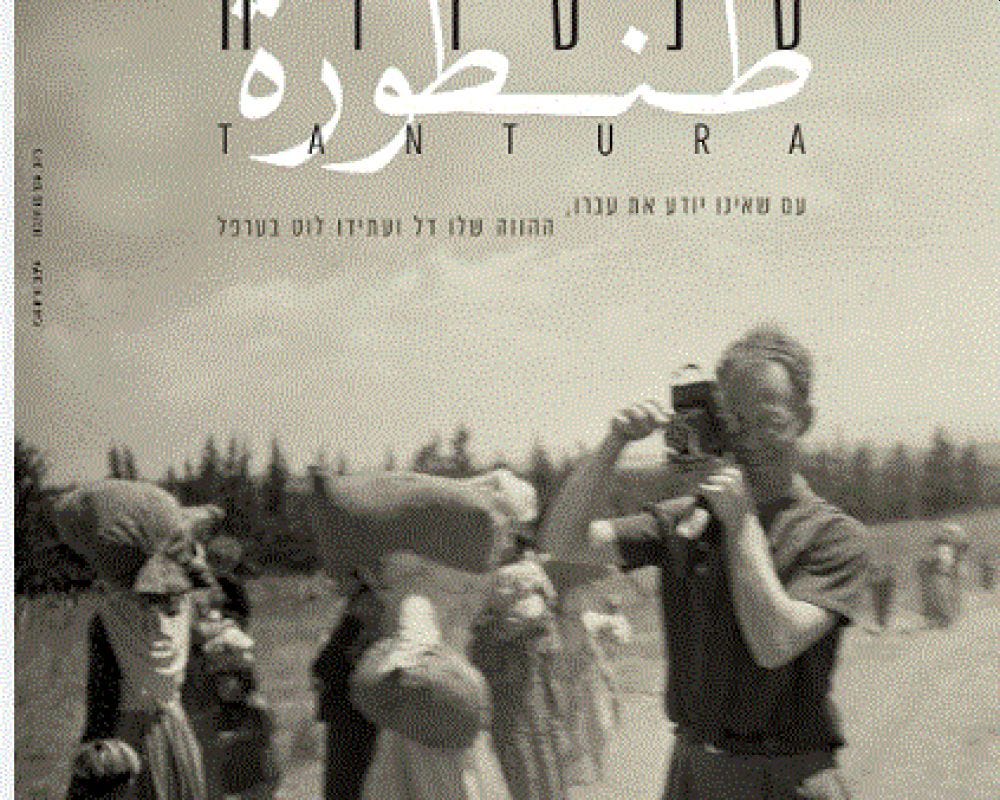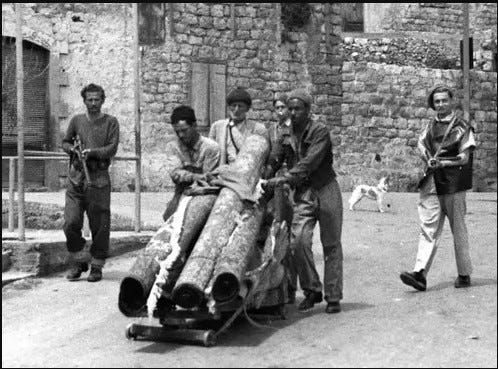Tantura (2022)
Revisiting a Massacre, Questioning Historical Narratives
Watching Tantura in the shadow of the ongoing genocide in Gaza feels like an unflinching confrontation with history repeating itself. The documentary from 2022, directed by Alon Schwarz, uncovers the issue of the long-suppressed massacre of Palestinians in the village of Tantura during the Nakba of 1948. Through interviews with Israeli soldiers and survivors, Schwarz exposes the chilling reality of what some try to deny or forget: the deliberate killing and dispossession of Palestinians in the name of creating Israel.
Erased history
Reflecting on the trauma and erasure of history, I am reminded of one of the first nonfiction books I read in my younger days—Bury My Heart at Wounded Knee by Dee Brown. The book’s account of the massacres and forced removals of Native Americans in the late 19th century left a lasting impression on me, as it revealed how a violent past could be manipulated and obscured by those in power. Similarly, Tantura is not just about the massacre itself; it is about the continued denial and suppression of the violence that was integral to the founding of Israel. As with Brown's portrayal of Native American suffering, Tantura serves as a reminder of the historical violence that remain buried under official narratives.
The documentary highlights Theodore Katz’s research, particularly his 1998 master’s thesis, which drew on interviews with Israeli veterans and Palestinian survivors to present an uncomfortable account of the massacre. Although the thesis received high marks, it became the centre of controversy in 2000. The very same veterans he had interviewed sued Katz for libel. Katz and his family endured harassment, and he was coerced into signing a statement retracting his conclusions—a decision he later regretted but was unable to undo.
In the documentary, we see Judge Drora Pilpel, who presided over the court case where Theodore Katz was accused years earlier, listening to tapes with testimonies from soldiers of the Alexandroni brigade recounting their involvement in killing Arab civilians. Pilpel reacts by saying, "This I never heard. If it's true, it is a shame... If he (Katz) had such things, he should have seen it through."
False narrative
One aspect of the documentary that stood out to me was the presentation of Ben Gurion's explicit orders, instructing soldiers to ensure that Arabs left the land. These directives were part of a broader Zionist strategy aimed at removing Palestinians from areas the new Israeli state sought to claim. In essence, it was about securing as much land as possible with as few Arabs as possible. The documentary illustrates how soldiers were left to determine how to achieve this, often resulting in violent and unlawful methods.
Ben Gurion’s actions and directives, as revealed in Tantura, expose the brutal truth behind the establishment of Israel. Far from being the hero Israel’s national myth often paints him as, Ben Gurion’s role in the ethnic cleansing of Palestine must be scrutinised. His goal was not only to remove Arabs from key areas but also to craft a narrative that concealed the violent reality of these forced displacements. He actively sought to create a sanitised version of history—one in which Palestinians voluntarily left, thereby denying any wrongdoing. His deliberate efforts to arrange staged scenarios, where journalists would document Israeli soldiers “helping” Arabs move, along with the research he commissioned to present the idea that Arabs left of their own accord, highlight his commitment to distorting the truth. He knew exactly what was happening and worked tirelessly to cover it up. Such behaviour can be called many things, but 'heroic' is certainly not one of them.
Facing the brutal truth
The film also includes interviews with four elderly residents of the kibbutz built on the land where Tantura once stood. One of the women argues that it is crucial to deny Arabs anything resembling a monument in the area, believing that recognition would grant them a sense of ownership over the land. Her stance appears to be: if it is important to them, then it is equally important for us to deny it. In contrast, another woman, who had travelled to Europe and witnessed how Europeans have confronted their painful history and acknowledged their role in the Holocaust, challenges this perspective. She advocates for facing the truth and taking responsibility for the darker chapters of the past also by Israel.
The issue of sexual violence is another disturbing aspect presented in the documentary. Survivors and eyewitnesses recount brutal rapes committed by Israeli soldiers during the occupation of Tantura. In one particularly chilling account, an elderly soldier casually laughs as he recalls another soldier raping a young girl. The horrifying nature of these crimes is undeniable, and the continued denial of such acts is deeply troubling. Refusing to acknowledge this violence is not only an injustice to the victims but also to the collective understanding of history.
What's Left Out?
As the film underscores, confronting uncomfortable truths is essential to fully grasp the scale of what occurred. This message feels even more urgent now, with the ongoing genocide in Gaza, where Israeli soldiers are documenting atrocities with gleeful pride—videos of which are being circulated and even shown at events—while Israeli politicians categorically deny these actions on international platforms. The documentary reveals how such behaviour is not new but is deeply rooted in the dehumanisation of Palestinians that dates back to the era of Ben Gurion.
The documentary also makes us ask: how many more “Tanturas” are out there? How many other Palestinian villages suffered the same fate, their stories forgotten and buried in Israeli archives, or left out of history? Tantura is not just one incident but a symbol of the violence, displacement, and erasure that has affected many Palestinian communities. This question lingers as you watch the film, urging us to consider the larger history of Israel’s founding.
In 1988, as certain historical records from the 1948 Arab-Israeli War were due for release, the Israeli state implemented strict criteria for determining which materials could remain classified. These restrictions specifically aimed to withhold documents that indicated instances of “deportation of Arabs,” “evacuation of communities and residents,” or “violent behavior towards prisoners that violates the Geneva Convention.” Other excluded material included records of “violent behavior towards the Arab population and acts of cruelty: killing, murder not in accordance with combat conditions, rape, robbery, looting” — essentially anything that could harm the image of the Israeli Defense Forces (IDF) by portraying it as “an occupying army devoid of moral standards.” Historian Adam Raz points out in the documentary that these measures were intended to protect Israel's founding myth and shield its actions during the 1948 war from scrutiny.
The Legacy of Tantura
This reflects the lengths to which Israel has gone to control narratives about its early history, prioritising the preservation of its moral legitimacy over the release of potentially uncomfortable truths. The legacy of the Tantura massacre is not just one of personal loss for the villagers, but also one of a fractured historical memory that continues to shape the present. As the documentary reveals, the trauma of that day has been passed down through generations, and the struggle for justice persists.
The film serves both as a historical document and a call to action, and with the ongoing genocide in Gaza, its importance grows even more. While the massacre in Tantura may not be widely known among Israelis, the Palestinians who lost loved ones there, of course, know better. The short video presented below, which highlights buried Palestinian history, is worth watching. It would be remiss not to applaud Katz and Schwarz for their courage in speaking out and telling the truth. However, this raises a troubling question: is an Israeli massacre only considered proven when Israelis speak about it? Palestinians have been talking about this for a long time, yet it seems some only regard it as evidence if it comes from an Israeli source.
The technical aspects of Tantura are well done, using a mix of old footage, present-day interviews, and tapes of Katz's interviews to tell the story. The director skillfully combines these elements to create a powerful narrative. The film features a mix of languages, with interviews in Arabic, Hebrew and English, which adds depth to the storytelling. The cutting of Katz's interview tapes, and videos of him from the 90s are particularly effective, driving the narrative forward and adding emotional weight to the testimony. The inclusion of experts also adds significant academic weight to the story, providing valuable context and emphasizing the importance of the subject matter.
All in all, watch the movie—it’s painful, but worth it!
All articles on Diaspora Dialogue are free to read for one year from publication. If you’ve enjoyed this piece and would like to support my work, you can do so by subscribing, or by buying me a coffee. Thank you for reading and being part of the dialogue!




